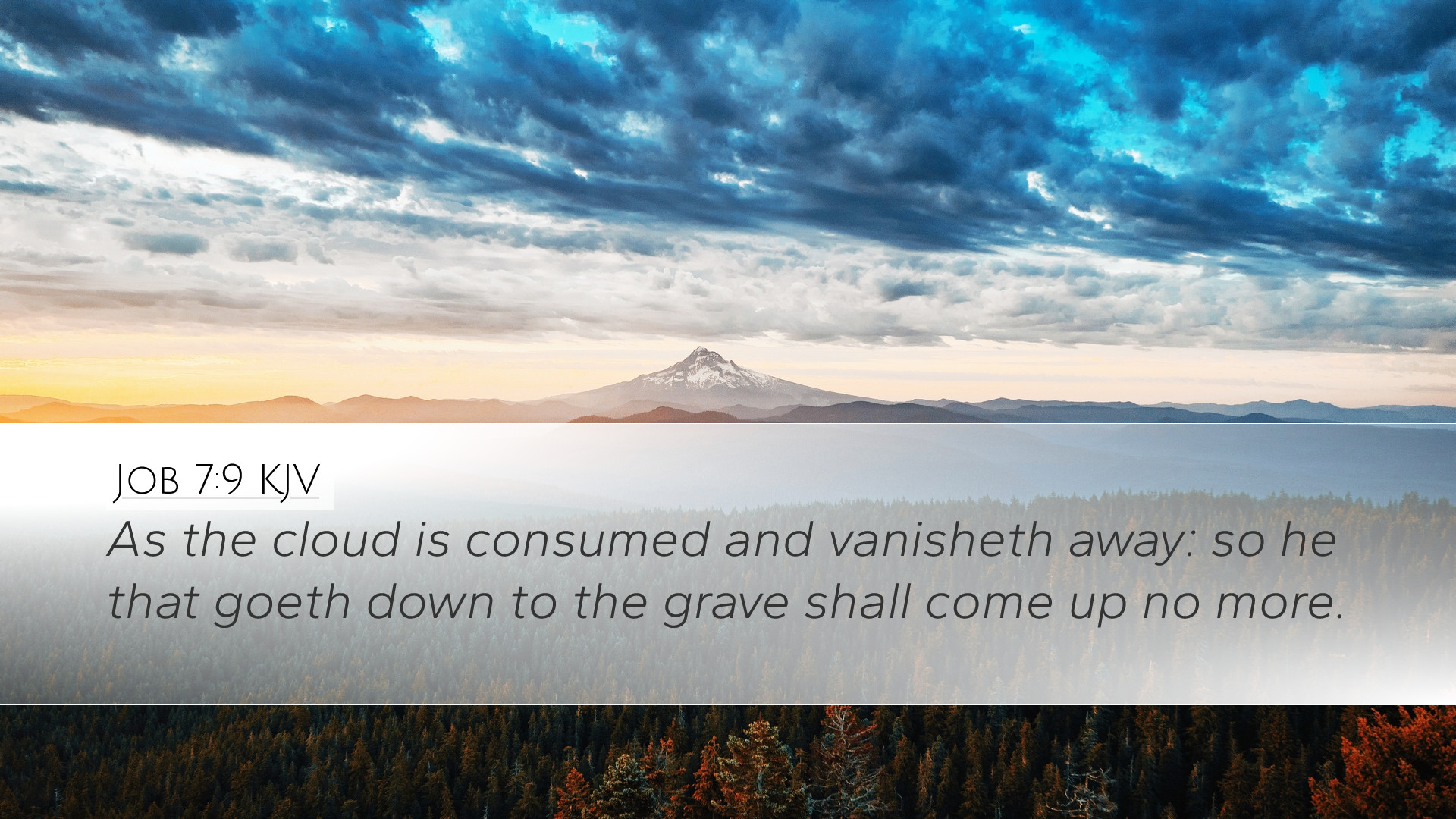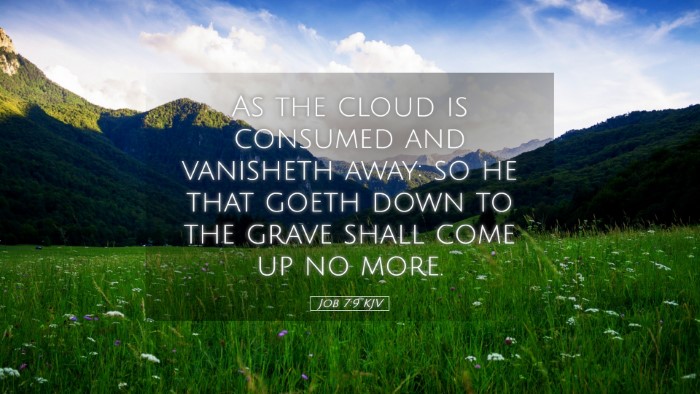Old Testament
Genesis Exodus Leviticus Numbers Deuteronomy Joshua Judges Ruth 1 Samuel 2 Samuel 1 Kings 2 Kings 1 Chronicles 2 Chronicles Ezra Nehemiah Esther Job Psalms Proverbs Ecclesiastes Song of Solomon Isaiah Jeremiah Lamentations Ezekiel Daniel Hosea Joel Amos Obadiah Jonah Micah Nahum Habakkuk Zephaniah Haggai Zechariah MalachiJob 7:9
Job 7:9 KJV
As the cloud is consumed and vanisheth away: so he that goeth down to the grave shall come up no more.
Job 7:9 Bible Commentary
Commentary on Job 7:9
Verse Summary: Job 7:9 states, "As the cloud is consumed and vanisheth away: so he that goeth down to the grave shall come up no more." This verse captures the essence of Job's deep despair and the transient nature of life.
Contextual Background
The Book of Job is a profound exploration of suffering, faith, and divine justice. Job, a righteous man, faces immense suffering and loss, prompting his contemplations in moments of despair. The verses surrounding Job 7 reveal his anguished thoughts concerning mortality and the seeming futility of life.
Insights from Matthew Henry
Matthew Henry emphasizes the transient nature of human existence as depicted in this verse. He draws a parallel between the fleeting clouds and the inevitable decay of humanity. Job reflects on how clouds, though initially full and promising, eventually dissipate. In a similar vein, human life appears vibrant yet is subject to decay and death.
- Tenuous Life: Henry notes that life is full of vanity—a key theme in Job's discourse. Just as clouds vanish, so too do the dreams and aspirations of mankind.
- Hope Beyond Death: While Job mourns his state, Henry suggests that there can be hope in understanding life beyond the grave. Though Job expresses a bleak outlook, the reader may contemplate the promise of resurrection and eternal life through faith.
Insights from Adam Clarke
Adam Clarke offers a detailed analysis of the imagery in Job 7:9, indicating that Job uses metaphors from nature to illustrate his despair. Clarke states that Job’s reference to the cloud signifies that both are subject to divine disposition, illustrating human vulnerability before God’s will.
- Ephemeral Existence: Clarke argues that Job’s lament underlines the short-lived nature of man in contrast to the vastness of eternity.
- A Cry for Understanding: Clarke posits that Job’s rhetorical question reveals his deep longing for an audience with God to understand his suffering, emphasizing the human need for divine engagement.
Insights from Albert Barnes
Albert Barnes reflects on the implications of Job’s assertion about death. In his view, Barnes interprets Job's comments about life and death as a profound expression of despair and the longing for life’s continuance beyond the grave.
- Death's Finality: Barnes emphasizes that Job is grappling with the idea of life being fleeting and death's permanence, suggesting that once one descends to the grave, their earthly existence effectively ends.
- Universal Truth: This verse encapsulates a universal truth regarding mortality that resonates with the human condition, a theme common throughout the Scriptures.
Theological Reflections
Job's lament provides a poignant moment to reflect on the human condition, suffering, and divine purpose. The themes of despair and hope are woven throughout the narrative, leading scholars and theologians to recognize the complexity of faith amid trials.
- Understanding Suffering: The acknowledgment of suffering as an intrinsic part of life prompts deeper exploration into the nature of God, the purpose of suffering, and the hope found in faith.
- The Nature of Existence: The verse invites theological reflection on life’s significance, prompting questions about the nature of existence and what comes after death.
- Hope in Resurrection: From a Christian perspective, Job's cry also foreshadows the hope found in the resurrection, bridging the gap between despair and the promise of eternal life.
Practical Applications
For pastors, students, theologians, and Bible scholars, Job 7:9 serves as a catalyst for discussions on suffering, hope, and the transient nature of life. Practical applications can stem from understanding this verse:
- Comfort in Suffering: Pastors may find solace in Job’s account to provide comfort to those enduring hardship, emphasizing that their pain is acknowledged in scripture.
- Encouraging Faith: Engaging with the transient nature of life while emphasizing faith can offer encouragement to seek solace in God's promises amid trials.
- Deepening Theological Exploration: The verse sparks theological debate regarding eschatology and the nature of death, prompting further study into biblical doctrines concerning life after death.
Conclusion
Job 7:9 serves as a rich source of contemplation on the human experience of suffering, mortality, and the deep-seated yearning for understanding. Through the insights of renowned commentators such as Matthew Henry, Adam Clarke, and Albert Barnes, this verse not only underscores the fragility of life but also invites exploration into the hope that can be found in faith. It stands as a testament to the complex journey of understanding suffering and the divine presence amidst our earthly trials.


